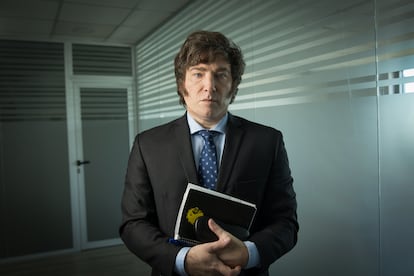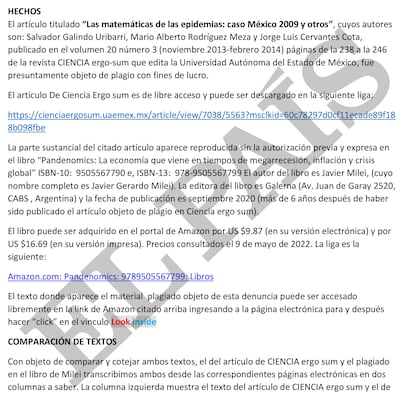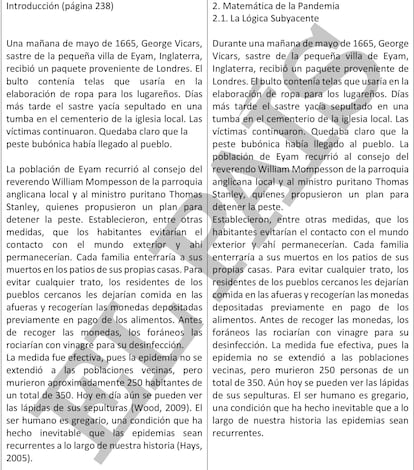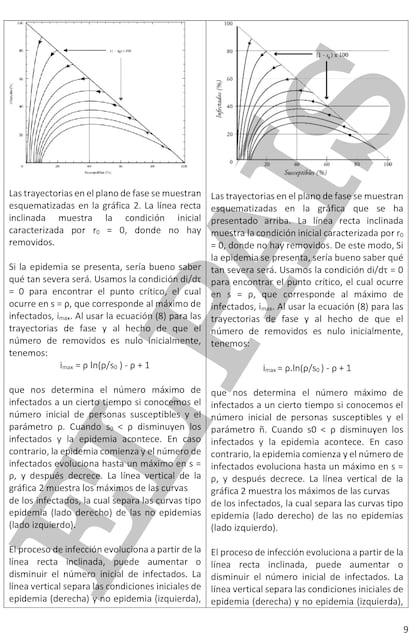Javier Milei: How the Argentine presidential candidate plagiarized three Mexican scientists
The far-right politician — who is competing in a runoff election this Sunday — copied entire fragments of an academic article that came out six years before he published his book ‘Pandenomics.’ This is according to court documents to which EL PAÍS has had access

Mexican scientist Salvador Galindo Uribarri didn’t know who Javier Milei was until a journalist contacted him in May last year. It was then that the researcher realized that an article he had written with two colleagues — Mario Rodríguez Mesa and Jorge Luis Cervantes Cota — had been plagiarized in Pandenomics, a book published by Javier Milei in 2020. The far-right Argentine politician — who is running to be the next president — released the book six years after the original academic publication came out.
A few days after the journalist contacted him, Galindo Uribarri bought the book to see the plagiarism with his own eyes. He recognized several paragraphs throughout the book — in both the introduction and in the sections offering historical context, to make reading more enjoyable — as well as equations that the authors had included to make their point clear. All of this had been copied by Milei.
At that moment, the scientist decided that he wasn’t going to sit idly by — he was going to use all the legal means available to him and file a complaint. “A substantial part of the [academic] article appears reproduced without prior and express authorization in the book,” reads the complaint, to which EL PAÍS has had access. “This, in itself, allegedly constitutes a crime,” the document notes.

“Initially, the plagiarism made us laugh. Then, we felt surprised: the shocking thing is that he didn’t even make an attempt to paraphrase the text,” said Galindo Uribarri — the principal author of The Mathematics of Epidemics: Case of Mexico, 2009 and numerous other papers — in an interview with the Argentine magazine Noticias.
The physicist — who has a doctorate from the University of Oxford — was interviewed by journalists Tomás Rodríguez and Juan Luis González on May 17, 2022. Five days later, the scientist filed a legal complaint, not only on behalf of the affected authors, but also on behalf of the Autonomous University of Mexico State, which, in early-2014, had published the original text in the journal Ciencia ergo sum. “The problem is that nothing has happened following the complaint. The idea is for there to be consequences,” he noted. However, the 72-year-old scientist died of cancer on September 3, 2022, just four months after giving the interview to Argentine media.
“He was offended to the core,” recalls his widow, Susana Bianconi, from Argentina. “Milei’s opportunism was evident, what he did tells you a lot about his impudence, his baseness, his contempt for other people and for their work,” she points out. “I imagine that he must have had a team of students do the copy-pasting and that he didn’t even read it, even though he copied everything, even the anecdotes that my husband used to entertain the reader,” she laments.
In the complaint, both texts are compared in two columns: the original — on epidemic statistics — and Milei’s, which deals with the Covid-19 pandemic. “One morning, in May 1665, George Vicars — a tailor from the small town of Eyam, England — received a package from London,” wrote Galindo Uribarri and his two co-authors in the introduction of their article. Milei copied the exact same phrase and only added “on” at the beginning of the sentence, as recorded in the electronic version of Pandenomics.

“Human beings are gregarious, a condition that has made epidemics inevitable throughout our history,” the Mexican authors point out, citing historian J. N. Hays. Milei barely changed the order of the sentence, nor did he bother to include any source.
There are so many examples that they fill almost 10 pages of the judicial document. The CopyLeaks portal — which compares similarities between two texts — shows that the beginning of the second chapter of Milei’s book is 99.6% directly copied from the introduction of the Ciencia ergo sum article. Other anti-plagiarism tools — such as the Duplichecker software — detect that many of Milei’s lines actually come from Galindo Uribarri’s article.
Milei also used entire paragraphs from the article to explain mathematical models, along with equations containing the same numerals. The complaint notes that even the design of the graphs in the book comes from Galindo Uribarri et al. The politician from the far-right Libertad Avanza (Freedom Advances) coalition even maintained the use of the first-person plural — as the scientists did — to detail his results: “we observe, we emphasize, we wonder.”

There is, however, a crucial difference between both texts: the one by the Mexican scientists is free to access. Milei’s book — printed by the Galerna publishing house — is sold on Amazon for $18.95, while an electronic version costs $9.99. “Milei is selling his book, while the royalties don’t go to the coffers of the Autonomous University of Mexico State, as they should,” the complaint reads.
Accusations of plagiarism hung over Milei throughout his entire career, whether it be his academic publications, his campaign spots or even his autobiography. “Javier, I can’t cite your references properly, because in the last book you wrote, you’re facing three complaints of plagiarism,” snapped Minister of Finance Sergio Massa — the candidate for the center-left ruling party — in the final presidential debate last weekend. That was the last face-to-face confrontation between the two candidates before more than 35 million Argentines will go to the polls on Sunday to elect their next president.
Last year, the newspaper Perfil published the most extensive journalistic investigation into plagiarism in Pandenomics. The book also borrows from Spaniard Antonio Guirao — a physicist at the University of Murcia — and Gita Gopinath, an economist at the IMF, among others. “It’s not that he had rehashed [their thoughts] — it’s a complete copy-and-paste job, paragraphs upon paragraphs have been copied,” Guirao told El Confidencial this past week. His case goes one step further: Milei not only stole his research, he also distorted his conclusions and interpreted the results in a way to justify his own views.
The politician’s entourage has minimized each of the claims about plagiarism, or has attributed the complaints to the “nervousness” that his candidacy causes among his adversaries. “I only remember some statement that Milei made last year about how there had been only a few pages copied... as if to say ‘what are you complaining about?’” recalls Bianconi. On that occasion, Milei’s team did not comment on the candidate’s remarks.
At the end of August, Ramiro Vasena — a candidate for a small liberal party in Argentina — filed a complaint in a Buenos Aires court against Milei for plagiarism in Pandenomics. He describes the candidate as “a compulsive plagiarist,” according to Argentine media. Bianconi, however, was not aware of that case, nor does she know about the progress of the lawsuit that her deceased husband filed in Mexico.
“My husband’s email and phone died with him. If [the court] answered him, I’ll never know,” Bianconi sighs. “I don’t feel I have the right to do it for him,” she admits, when asked about the possibility of continuing with his legal battle. EL PAÍS contacted the Autonomous University of Mexico State, which did not comment in time for the publication of this report.
“Justice is very slow,” Galindo Uribarri told Noticias. A year after his death, his widow remembers him as a brilliant man who understood science as a great symphony. An admirer of Einstein, he popularized science for general audiences and was passionate about understanding the universe.
Bianconi’s life partner left her with a splendid library. The two shared a love of nature. She still laughs when remembering his books, or his overflowing emotions whenever he spoke about physics. That’s a legacy that cannot be imitated or stolen.
Sign up for our weekly newsletter to get more English-language news coverage from EL PAÍS USA Edition
Tu suscripción se está usando en otro dispositivo
¿Quieres añadir otro usuario a tu suscripción?
Si continúas leyendo en este dispositivo, no se podrá leer en el otro.
FlechaTu suscripción se está usando en otro dispositivo y solo puedes acceder a EL PAÍS desde un dispositivo a la vez.
Si quieres compartir tu cuenta, cambia tu suscripción a la modalidad Premium, así podrás añadir otro usuario. Cada uno accederá con su propia cuenta de email, lo que os permitirá personalizar vuestra experiencia en EL PAÍS.
¿Tienes una suscripción de empresa? Accede aquí para contratar más cuentas.
En el caso de no saber quién está usando tu cuenta, te recomendamos cambiar tu contraseña aquí.
Si decides continuar compartiendo tu cuenta, este mensaje se mostrará en tu dispositivo y en el de la otra persona que está usando tu cuenta de forma indefinida, afectando a tu experiencia de lectura. Puedes consultar aquí los términos y condiciones de la suscripción digital.









































